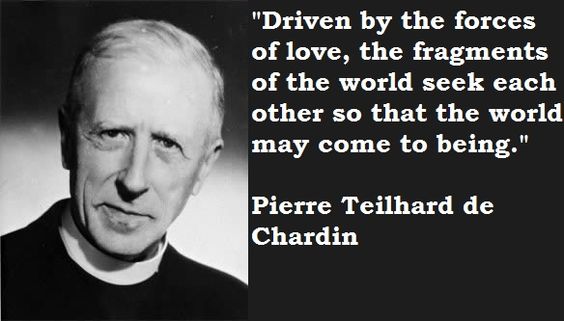Dressed in traditional Anglican vestments and preaching in the Gothic beauty of St. George’s chapel at Windsor Castle, Bishop Michael Bruce Curry delivered a sermon for the wedding of England’s Prince Harry and Meghan Markle that was surprisingly nontraditional.
Bishop Curry—who is the first African-American presiding bishop of the Episcopal Church, which is in shaky communion with the Anglican Church—already made news by being the first American to preach at a royal wedding. Yet Roman Catholics tuning in to the royal wedding were also surprised and delighted to hear Bishop Murray talk about another groundbreaking figure, Jesuit philosopher and paleontologist Pierre Teilhard de Chardin.
“If humanity ever captures the energy of love, it will be the second time in history that we have discovered fire.”
Bishop Curry described Teilhard as “one of the great minds, great spirits of the 20th century.” Alluding to Teilhard’s essay, “The Evolution of Chastity,” Bishop Curry said, “the discovery, or invention, or harnessing of fire was one of the great scientific and technological discoveries of human history.”“If humanity ever captures the energy of love, it will be the second time in history that we have discovered fire,” he later added.
Roman Catholics following the Royal Wedding took to Twitter to express their surprise at the Jesuit priest’s remarks being quoted in an Anglican wedding.
Someday, after mastering the winds, the waves, the tides and gravity, we shall harness for God the energies of love, and then, for a second time in the history of the world, man will have discovered fire.—Teilhard de Chardin
— Robert Ellsberg (@RobertEllsberg) 12:40 PM – May 19, 2018
Wow… what a fiery homily! A French Jesuit of the 20th century, Fr. Teilhard de Chardin, makes it into the Royal Wedding Homily! https://twitter.com/SkyNews/status/997802005555892225 …
— Thomas Rosica (@FatherRosica) 12:47 PM – May 19, 2018
Shout out to Catholic Jesuit Priest Teilhard de Chardin, SJ, at #RoyalWedding .
“If humanity ever harnesses the energy of fire again, if humanity ever captures the energy of love, it would be the second time in history that we have discovered fire.” https://www.youtube.com/watch?v=fTMWJU9Nafk …
— Quang D. Tran, S.J. (@LeMeTellUSumtin) 2:59 PM – May 19, 2018
I never, ever thought we’d hear Pierre Teilhard de Chardin preached at @RoyalWedding Just wow.
— Elizabeth Scalia (@TheAnchoress) 1:54 PM – May 19, 2018
Who was this priest whom Bishop Curry called “scientist, a scholar, a mystic”?
At the time of his death in 1955, Teilhard “was widely recognized in U.S. scientific circles for his work on the geology of Asia and his studies of Peking Man. Otherwise, he was virtually unknown,” Thomas M. King wrote in America in 2005.
A theologian and paleontologist, Teilhard advanced a new kind of thinking, arguing that “Christ was progressively uniting all thing to become the one in whom ‘all things hold together,’” according to King. Yet his writings were controversial for blending scientific language around evolution with Catholic spirituality, and called for Christians to work in the secular world for Christ could be found there.
His writings were controversial for blending scientific language around evolution with Catholic spirituality.
Teilhard’s writing has also drawn renewed scrutiny recently from scholars who argue that his evolutionary theology has roots in eugenicist ideology and that his legacy should therefore be reassessed.
King argues Teilhard’s works had a major impact on the Second Vatican Council after his death. He writes, “The council’s ‘Pastoral Constitution on the Church in the Modern World’” (1963) reaches out to the secular world by stressing the value of the secular and the wonders of technology. It sees scientists working ‘with a humble and steady mind,’ being led by the hand of God and Christ as Omega, ‘the goal of human history.’”
Today the church recognizes Teilhard’s influence on its modern dealings with science and the secular world. Msgr. Melchor Sanchez de Toca, undersecretary of the Pontifical Council for Culture, noted that Teilhard’s work was groundbreaking because “it was not a simple reconciliation of science and faith; it was integrating, creating a single, wholistic vision.”
In November, participants in a plenary council for the Pontifical Council for Culture formally asked Pope Francis to remove a “monitum” that was placed on Teilhard’s works in 1962. The official warning against his works no longer holds weight, the participants argued, because “his prophetic vision has been and is inspiring theologians and scientists” and his work has been explicitly cited by four popes.
Acknowledgment – America, a journal
ffcb2c1c7ea7beec9b7ba4c8331c1c34.jpg



